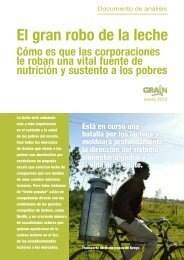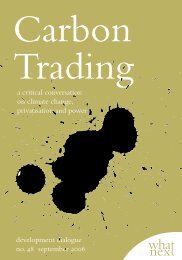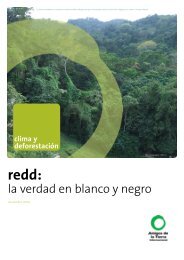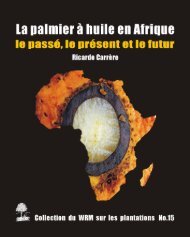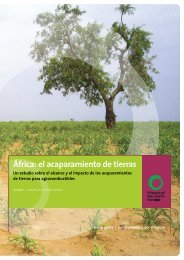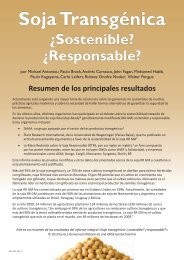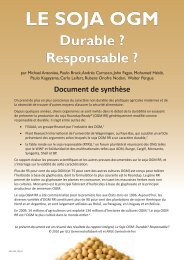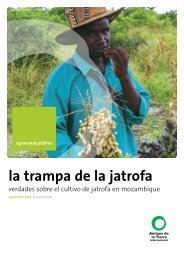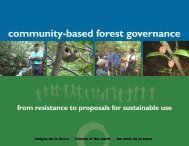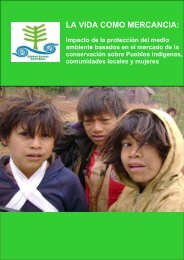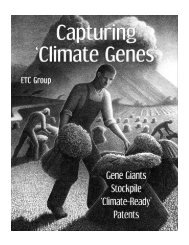Plantations, poverty and power - Critical Information Collective
Plantations, poverty and power - Critical Information Collective
Plantations, poverty and power - Critical Information Collective
You also want an ePaper? Increase the reach of your titles
YUMPU automatically turns print PDFs into web optimized ePapers that Google loves.
15<br />
In his book, “Khor Jor Kor, Forest Politics in Thail<strong>and</strong>”, Oliver Pye notes that, “The Khor Jor Kor Project<br />
represented a pinnacle of state-directed authoritarian forestry. It was closely connected with the return to<br />
military dictatorship in Thail<strong>and</strong>.” 38 The plan was defeated by large scale rural protests <strong>and</strong> when a broadbased<br />
movement resulted in the end of the military junta in May 1992, the scheme was dropped. 39<br />
South Africa’s plantation boom took place during the apartheid regime, under which black people lost all<br />
their rights, including rights to l<strong>and</strong>. The South African pulp <strong>and</strong> paper company Mondi was formed in<br />
1967, during the apartheid regime. The company exp<strong>and</strong>ed its plantations rapidly during the 1980s,<br />
buying up hundreds of farms to become one of South Africa’s largest l<strong>and</strong>-owners. According to Mondi<br />
48 per cent of its l<strong>and</strong> is currently under l<strong>and</strong> claims. 40<br />
The Finnish consulting firm, Jaakko Pöyry, it seems, had no qualms about working for Mondi during the<br />
brutal apartheid regime. Mondi’s Richards Bay pulp mill was commissioned in 1984, 41 at the height of<br />
the company’s apartheid-backed l<strong>and</strong> grab. Pöyry won a series of contracts from Mondi on its Richards<br />
Bay mill going back to the start of the project.<br />
The expansion of the area of industrial tree plantations in Chile took place under Pinochet’s brutal neoliberal<br />
dictatorship. Under the Chilean Decree Law 701, the Chilean government reimbursed companies<br />
most of their development <strong>and</strong> management costs for establishing industrial tree plantations. 42<br />
The area of Brazil’s plantations exp<strong>and</strong>ed as the result of a generous series of tax breaks for companies<br />
which established plantations. The subsidies ran from 1967 to the early 1980s, 43 implemented under<br />
Brazil’s military dictatorship.<br />
Uruguay’s plantations also exp<strong>and</strong>ed in part during a military dictatorship, with the foundations for the<br />
country’s plantations boom being laid in 1951, when a joint FAO <strong>and</strong> World Bank mission made a series<br />
of recommendations for the country’s forestry sector, which, taken togetherwith those of a later FAO<br />
mission, formed the basis for forestry laws adopted in 1968 <strong>and</strong> 1987. 44<br />
When a company has covered thous<strong>and</strong>s of hectares of l<strong>and</strong> with tree monocultures, the next step is often<br />
to build a pulp mill. More government subsidies are available, such as Free Trade Zone status for the mill<br />
(thus avoiding the need to pay taxes or duties on imported machinery to build the mill). Other subsidies<br />
might include the building of roads or ports to transport fibre to the mill <strong>and</strong> to export the pulp.<br />
International treaties can also be a form of government subsidy – covering topics such as insurance <strong>and</strong><br />
38 Oliver Pye (2005) Khor Jor Kor Forest Politics in Thail<strong>and</strong>, White Lotus Press, page 109.<br />
39 Ricardo Carrere <strong>and</strong> Larry Lohmann (1996) Pulping the South Industrial Tree <strong>Plantations</strong> <strong>and</strong> the World Paper Economy,<br />
Zed Books, page 237.<br />
40 “L<strong>and</strong> claims <strong>and</strong> indigenous people”, Mondi’s website: http://www.mondigroup.com/desktopdefault.aspx/tabid-1153/<br />
41 Graham Ferreira (2005) “Richards Bay expansion: Higher capacity, improved environmental performance”, Know-How<br />
Wire, Jaakko Pöyry Client Magazine, June 2005.<br />
42 Dennis Neilson (2007) “Corporate Private Sector Dimensions in Planted Forest Investments”, Forestry Department Food<br />
<strong>and</strong> Agriculture Organization of the United Nations Planted Forests <strong>and</strong> Trees Working Paper Series, Working Paper<br />
FP/40E, October 2007. http://www.fao.org/forestry/site/10368/en/<br />
43 Dennis Neilson (2007) “Corporate Private Sector Dimensions in Planted Forest Investments”, Forestry Department Food<br />
<strong>and</strong> Agriculture Organization of the United Nations Planted Forests <strong>and</strong> Trees Working Paper Series, Working Paper<br />
FP/40E, October 2007. http://www.fao.org/forestry/site/10368/en/<br />
44 “Uruguay: Either with the people or with pulp mills <strong>and</strong> tree plantations”, World Rainforest Movement Bulletin no. 83,<br />
June 2004. http://www.wrm.org.uy/bulletin/83/Uruguay.html



